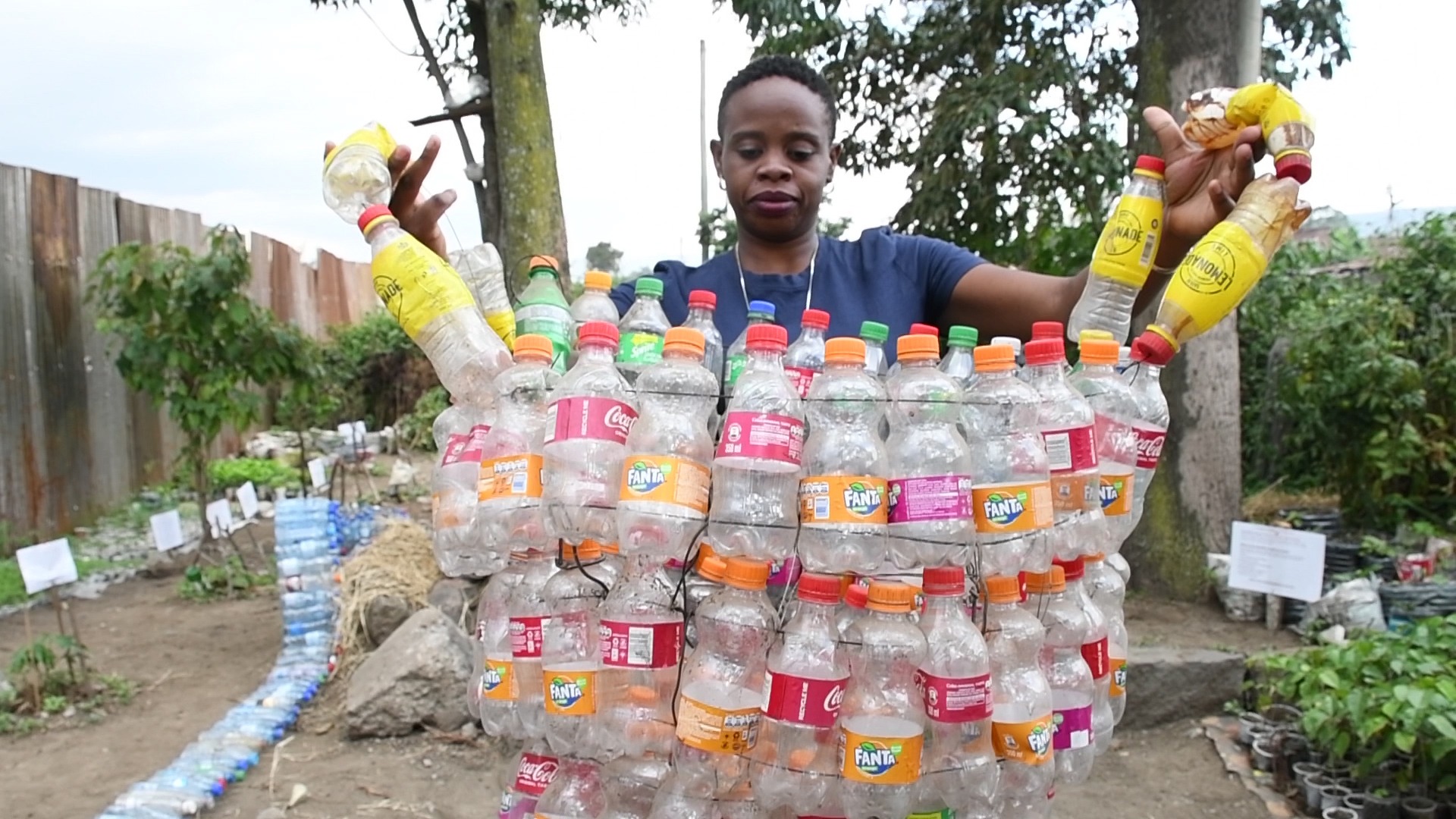Like many places in Kenya, Nakuru faces challenges from solid waste that clog drains, litter streets and wash into waterways and Lake Nakuru.
As the country forges towards managing solid waste disposal, the local community in the sprawling Bondeni slums is steps ahead in the recycling business and is turning discarded plastic bottles and used car tyres into a fortune.
They have also gone a notch higher in redefining the narrative about environmental conservation by manufacturing briquettes from a blend of charcoal dust and cow dung as one way of reducing reliance on firewood thus reducing destruction of forests.
By recycling junk, the Bondeni community under the umbrella Mazingira Network which brings together more than 10 environmental conservation lobbies is promoting a recycling culture that can help address the county’s waste management challenges.
Mazingira Network has been promoting recycling of non-biodegradable waste not only for creating a clean and safe environment but also improving economic well-being of the slum’s dwellers.
Twenty-Eight -year old Consalata Wanjohi says while most people consider discarded plastic bottles as rubbish and disgusting, her environment conservation group sees it as raw material for pure art.
Wanjohi, a member of ‘Bidii Yangu Environment Conservation Group’ is giving life to used plastics as a way of reducing their pollution, dumping and burning.
She works with 17 women, mostly in her veranda at home, treading the plastic bottles into fashionable colorful laundry baskets, flower vases, shoe racks, shopping baskets and utensil racks among others.
Wanjohi prefers to call her creative process ‘up cycling’ when she transforms plastic bottles into incredible and artistic products.
“We came together as a team to clean up our estate by collecting garbage. We are promoting the notion particularly among women and youth groups that plastic can be recycled and transformed into better quality products with environmental value,” adds Wanjohi.
Together with her team, they collect plastic bottles from local businesses and waste centres, clean and separate them.
They also retrieve the bottles from waterways. They then sort them according to colour and size after the cleaning process before proceeding to make entirely new products.
‘Bidii Yangu Environment Conservation Group’s’ work highlights the importance of finding solutions to combat plastic pollution.
Today, more than 400 million tonnes of plastic waste are produced globally every year, half of which is designed to be used only once (single-use). This plastic waste can take hundreds of years to decompose and often ends up in the oceans and waterways, endangering marine ecosystems and ultimately harming human health.
However, Wanjohi says it has been a bumpy journey for them because they get a lot of negative energy from their friends and community, but this has not numbed their high spirit. They also grapple with lack of funding to expand their operation and conduct more research on recycling waste.
“Our dream is to inspire as many women as possible. We want to let women know that one doesn’t need to rely on a white-collar job, but you can create your job. Always look for opportunities and be your boss,” she enthuses.
The group doesn’t have a specific target clientele. Their product prices range from Ksh 500 to 6, 000.
What are some of the advantages of using their products? She says they are durable and affordable, and can be used both indoors and outdoors.
She reveals that the future looks bright because a new global shift is championing sustainability goals through using recycled materials and making products more recyclable. Also, people are becoming more eco-conscious with whatever they are buying.
For the competition, the group believes there is a market for every piece. Because of this, they are willing to train as many women as possible for free.
And to ensure that they remain relevant in the industry the groups rely hugely on research. To them, research has helped them come up with trendier items that are giving their venture a business sense.
‘Bidii Yangu Environment Conservation Group’ is also pioneering turning plastic bottles into materials for landscaping, building homes and constructing perimeter walls.
Martin Mwanthi for instance, the Secretary of the group, now owns a homestead surrounded by a perimeter wall made of stacked plastic bottles.
He says that building structures with waste plastic cut the costs by about 40 percent.
Mwanthi explains that constructing houses using plastic bottles reduces the need for other building materials, particularly sand and concrete blocks.
The group is also involved in recycling tyres sourced from garages, incinerators, and individuals, as well as those dumped by the roadside.
Once collected, these tyres are scrubbed free of grit and oil, followed by a rinse. These clean tyres are subsequently drilled in preparation for the final furnishings.
From there, the entrepreneurs create “artsy and ultra-modern” planters, flower pots, sandals among others, which happen to be sustainable and earth-friendly.
“Just as people plant vegetables in sacks, old tyres can also be recycled and used to plant kales, onions or crops that do not have tubers due to limited space,” Mwanthi states.
While noting that the National Transport and Safety Authority (NTSA) registers 7,000 vehicles monthly and 90,000 every year, he observes that as the number of vehicles on Kenyan roads continues to rise, the problem of scrap tyre disposal presents serious waste management challenges for society.
“This is because an average motor vehicle will go through several sets of tyres in its lifetime,”he argues.
“Finding creative ways to give old tyres a second life is an important conservation effort. We would like to urge Kenyans to stop burning tyres, especially since most people think the best way to dispose of scrap tyres is to burn them or throw them in dump sites. This, unfortunately, creates an environmental strain,” says Mwanthi.
It is estimated that in Kenya, about 34,000 tonnes of waste tyres have been burnt haphazardly, dumped, destroyed or re-used by methods that pollute the air, soils, and groundwater since 2010.
At Fanaka Bondeni Environmental Conservation Group its chairperson Mwanaisha Cheptoo offers that she and her 12 colleagues are actively propagating environmental conservation among their peers to encourage ‘value addition’ to discarded charcoal waste and cow dung.
The entire yard at the group’s workshop is a striking spectacle lined with bags of charcoal dust, and manure just waiting to be turned into finished products.
Cheptoo explains that before venturing into the business three years ago, Fanaka Bondeni Environmental Conservation Group found out that residents complained of eyes and respiratory diseases, especially among children and women, caused by smoky kitchens.
“We knew residents needed urgent intervention on clean fuel that could reduce the costs and also respiratory diseases,” she says. That gave them an idea of clean and affordable cooking solutions. Together they resolved to venture into safer and cheaper carbonized charcoal briquettes.
The group briefly researched how to produce charcoal briquettes and discovered the formula.
In less than a month, they had produced briquettes which were ready for sale and use. Residents rushed for the briquettes because they were cheaper.
“We sold at Ksh30, unlike the firewood that cost Ksh 100 or ordinary charcoal for Ksh 80 a tin,” recalls Cheptoo.
Despite being cheap, the business took longer to pick as it required demonstrations – many residents had never used briquettes before.
Along the way, more customers trooped in, mostly through referrals and from their social media platforms. Meanwhile, as their customer base grew, they started facing challenges in production.
Living and working in a rented premises, Cheptoo recalls, came with the challenge of getting a place to dry their briquettes as demand grew.
“We want to invest in a machine that can produce already dried briquettes, to save us time of drying,” she reveals.
The process starts with collecting charcoal wastes from charcoal vendors and cow dung from farmers.
These are mixed with water and moulded into briquettes.
This as the Government is banking on promoting entrepreneurship in waste management and enhanced enforcement to end the perennial garbage problem in the country.
Cabinet Secretary in charge of Environment, Climate Change and Forestry Soipan Tuya says promotion of waste recycling and reuse has become a more practical approach to solid waste management adding that with the increasing cost of raw materials, recycling provides a cheaper source for manufacturing industries.
The Government, she says, is working with devolved units to provide an enabling environment for investments in recycling as business ventures and is encouraging industry operators to set up recycling schemes for wastes including aluminum cans, bottles, and polythene materials to improve environmental conditions while also generating incomes to the poor.
She went on: “We need innovative technologies and approaches that change the way we think about, use and treat solid, liquid, domestic, industrial and commercial waste. Cities need to explore the 5Rs of Rethinking, Refusing, Reducing, Reusing and Recycling and opportunities that transform waste to wealth.”
Nakuru Governor Susan Kihika says the county’s population is growing at a rate of between 7 to 8 percent per year, which translated into increased solid waste.
An average of 45 per cent of waste goes uncollected in six major towns across the country, according to an official report by the National Environmental Complaints Committee.
Nairobi, Kisumu, Thika, Nakuru, Mombasa and Eldoret towns generate an estimated 6,000 tonnes of waste daily. However, only 3,962 tonnes are collected while over 2,000 tonnes remain uncollected.
According to the report, Mombasa tops the list with 770 tonnes of uncollected waste although 65 per cent of the 2,200 tonnes of generated waste is collected daily.
Kisumu County leads in those with the least effort being made to collect daily generated garbage.
Only 20 per cent is collected, according to the report, leaving 80 tonnes uncollected.
Nairobi tops the list in active waste collection – 80 per cent of the daily generated garbage is collected.
However, 240 tonnes of waste still goes uncollected.
Other towns including Eldoret leave behind 270 tonnes daily while Thika and Nakuru leave 60 and 138 tons respectively.
Kihika says her administration has entered into collaborations with other stakeholders to ensure that any valuable waste does not find its way to the dumpsite.
For the dumpsite combers and waste pickers like Cheptoo, Mwanthi and Wanjohi, it takes the contribution of all to make the desired difference.





